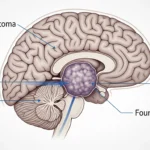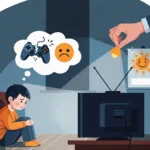
Have you ever noticed how a loud noise that once startled you suddenly stops bothering you?
Maybe you moved near train tracks, and now those rumbling trains barely wake you.
Or you’ve stopped hearing the hum of your fridge, the ticking clock, or even feeling your clothes on your skin.
That’s your brain doing something amazing — it’s called habituation.
Habituation is your brain’s built-in filter. It helps you ignore stuff that doesn’t matter so you can focus on what does.
It’s an ancient survival trick — your ancestors couldn’t waste time panicking over every rustling leaf when the real danger might be a lion.
What Is Habituation? A Simple Definition
Habituation is the brain’s way of saying “been there, seen that” — it’s a simple type of learning where your reaction to something fades the more you experience it.
Think of waking up to a noisy street the first night and barely noticing it a week later.
Psychologist Evgeny Sokolov kicked off formal study of this in the 1960s, and scientists now see habituation as the most basic form of learning across animals — from tiny single-celled creatures to us.
Important note: it’s not the same as sensory adaptation (that’s the sensors getting tired); habituation happens in your brain, which actively learns to filter out the boring, harmless stuff. Cool, right?
The Neuroscience Behind Habituation: How Your Brain Adapts
Inside your brain, habituation happens through tiny electrical conversations between neurons — and over time, those chats get quieter.
The first time you hear a sudden noise, your brain lights up with activity.
But after hearing it again and again, those neural connections chill out — a process called synaptic depression.
Your amygdala, the brain’s emotion center, stops overreacting, and your prefrontal cortex helps decide, “This isn’t a big deal.”
On a chemical level, your neurons release fewer neurotransmitters, and your receptors get a bit lazier about picking them up.
In short, your brain learns to save energy by tuning out what doesn’t matter — like a mental “Do Not Disturb” mode that keeps you focused on the real stuff.
The Characteristics of Habituation: What Makes It Unique
Psychologists have found that habituation has a few cool quirks that make it different from other kinds of learning — and honestly, your brain’s behavior here is pretty relatable.
Spontaneous Recovery
Ever gone on vacation, come back home, and suddenly realized how loud your neighborhood actually is? That’s your brain forgetting its old chill for a bit.
But don’t worry — after a few days, it’ll go right back to ignoring those train rumbles or barking dogs.
Stimulus Specificity
Your brain’s picky. You might completely tune out the sound of your alarm clock but jump out of bed when your friend’s phone alarm goes off.
Same idea, different sound — and suddenly your brain’s like, “Wait, what’s that?”
Dishabituation
Change the pattern, and boom — your brain wakes up again.
Imagine your alarm suddenly blasting a higher pitch or weird tune one morning. You’d notice it instantly.
That’s dishabituation in action — your brain’s way of saying, “New info! Pay attention!”
Frequency and Intensity Effects
The more you are exposed to something, the quicker you acclimatize to it.
But if it is actually intense — such as a fire alarm or your teacher yelling out your whole name — you will not tune it out that quickly.
That is your brain protecting you, so you never acclimatize to real danger.
Evolutionary Advantages: Why Habituation Matters for Survival
Imagine early man having to live in an eternal drama of wind, rustling leaves, and bird calls — if their brains were over-reactive to everything, they’d never even know when there was danger.
Habituation is your brain’s filter device: it allows you to screen out the boring stuff so you can focus on the important things, like a crackle in the bushes that might be a predator.
That conserved time, energy, and mental resources, free to problem-solve, build relationships, and be creative.
And since new always posed the risk of either threat or opportunity, we still have a natural affection for novelty — the ideal balance that challenged humans to explore and to innovate.
Habituation in Everyday Life: Real-World Applications
Relationships and the “Honeymoon Phase”
You know how it begins with butterflies and butterflies, and then it just stalls out? That’s not love fading.
That’s your brain adapting to having someone around.
The plus side is, you can reboot it.
Do something different together, go somewhere you’ve never been on vacation, shake up your routine. When it’s new, your brain — and heart — wake back up.
Workplace Productivity and Job Satisfaction
At first, a new job feels exciting — every task is fresh, every meeting matters.
But after a while, it can all start to blur together. That’s habituation too.
Smart companies fight this by mixing things up — rotating roles, setting new goals, or redesigning spaces.
Keeping work varied keeps your brain engaged.
Consumer Behavior and Marketing
Advertisers know your brain gets bored fast.
That’s why ads, logos, and product designs keep changing — it’s to fight “ad fatigue.”
Think of your favorite brand suddenly dropping a limited edition or seasonal version — that’s them using your brain’s craving for novelty to grab your attention again.
Mental Health and Therapeutic Applications
That’s where habituation actually does its magic. That’s how it restores people.
They use it in exposure therapy, very slowly and incrementally exposing someone to whatever is the biggest terror for them. Bite by bite, the terror rots away.
That’s how people with phobias or PTSD can tell themselves, “Hold on, this isn’t really dangerous anymore.”
Bit by bit, your brain becomes conditioned to remain calm. That’s all about doing those steps one at a time..
The Dark Side: When Habituation Works Against Us
Habituation usually helps us, but sometimes it backfires — especially in modern life, where comfort and routine can quietly mess with our emotions and awareness.
Here’s how:
Hedonic Adaptation
Ever wanted something so bad — a new phone, new shoes, or maybe that dream job — and then, a few weeks later, it doesn’t feel all that special anymore?
That’s hedonic adaptation, a fancy term for “getting used to happiness.”
Your brain gets the high, then resets. It’s why chasing stuff or status can feel like running on a treadmill — lots of effort, but you never really arrive.
Relationship Complacency
Remember how exciting it feels when you first start liking someone?
Every text, every smile feels electric. But after a while, that thrill fades — not because love is gone, but because your brain’s gotten comfy.
Suddenly, what used to feel special becomes “normal.”
That’s why showing appreciation and trying new things together matters — it keeps your brain from putting your relationship on autopilot.
Warning Sign Blindness
This one catches you off guard.
We can become accustomed to small things and not pay attention to when they turn bad — like overlooking chronic fatigue, dismissing signs that something is wrong in a relationship, or embracing a toxic dynamic because it “doesn’t feel that bad anymore.”
It’s that old “boiling frog” myth: when things go more and more poorly in a gradual process, we do not jump out until it is too late.
Environmental Numbness
Thanks to nonstop media, our brains get hit with bad news 24/7 — violence, disasters, suffering.
At first, we care deeply, but over time, we start to feel… numb. That’s habituation too.
The danger? When we stop feeling, we stop acting. Staying empathetic takes effort — but it’s what keeps us human.
Practical Strategies to Combat Negative Habituation
Here’s the thing — you can’t stop your brain from getting used to things, but you can hack it.
Once you understand how habituation works, you can use it to keep life feeling fresh and meaningful. Here’s how:
Practice Gratitude and Mindfulness
Your brain loves to take good things for granted — friends, comfort, even peace of mind.
Gratitude is your secret weapon against that. Write down three things you’re thankful for every day, even small stuff like “my dog’s goofy face” or “the smell of rain.”
It forces your brain to look again and say, “Oh right, that’s awesome.”
Mindfulness does the same thing.
It’s basically paying full attention — to your food, your walk, your breath — like you’re experiencing it for the first time.
Sounds simple, but it can totally reset how you feel about your everyday life.
Use Intentional Novelty
Your brain is hungry for novelty.
Do something out of the box — go a different way to school, listen to some music you’d normally skip past, or attempt to create something that could go horribly wrong (but hell, that’s half the fun).
In relationships, be different — surprise one another with a night out or just vary how you spend time together.
Shock your brain out of auto-mode with unexpected changes.
Take Strategic Breaks
Occasionally you don’t require more — you require a break.
Stepping back from what you’re accustomed to — work, others, even your phone — reboots your brain.
Do you ever feel you miss your favorite friend more if you spend a day or two apart? Or appreciate how lovely silence is after a day on the web? That’s your brain catching up on what it wasn’t able to take in.
Create Awareness Triggers
Place small reminders to pay attention to what is important.
A sticky note on your mirror that reads “Be grateful.”
A phone reminder that displays you “Look up — the sky’s insane today.”
A wrist reminder to breathe. These small reminders shock your brain out of autopilot and add the color of life back in focus.
Conclusion: Harnessing Habituation for a Better Life
Habituation is your brain’s internal short cut — convenient when it helps you tune out background noises, but the cause of frustration when it leads you to take the good stuff for granted.
Catch yourself when it’s working for you (such as remaining alert in class) and when it’s borrowing pleasure (that ticking clock or morning coffee that once was magic).
Use small hacks — gratitude, mindful novelty, breaks, and reminders — to flip the switch and keep life interesting.
Your brain is not broken; it’s doing its job. It’s your choice: let habituation take the autopilot route, or use it to stay curious, grateful, and present.



